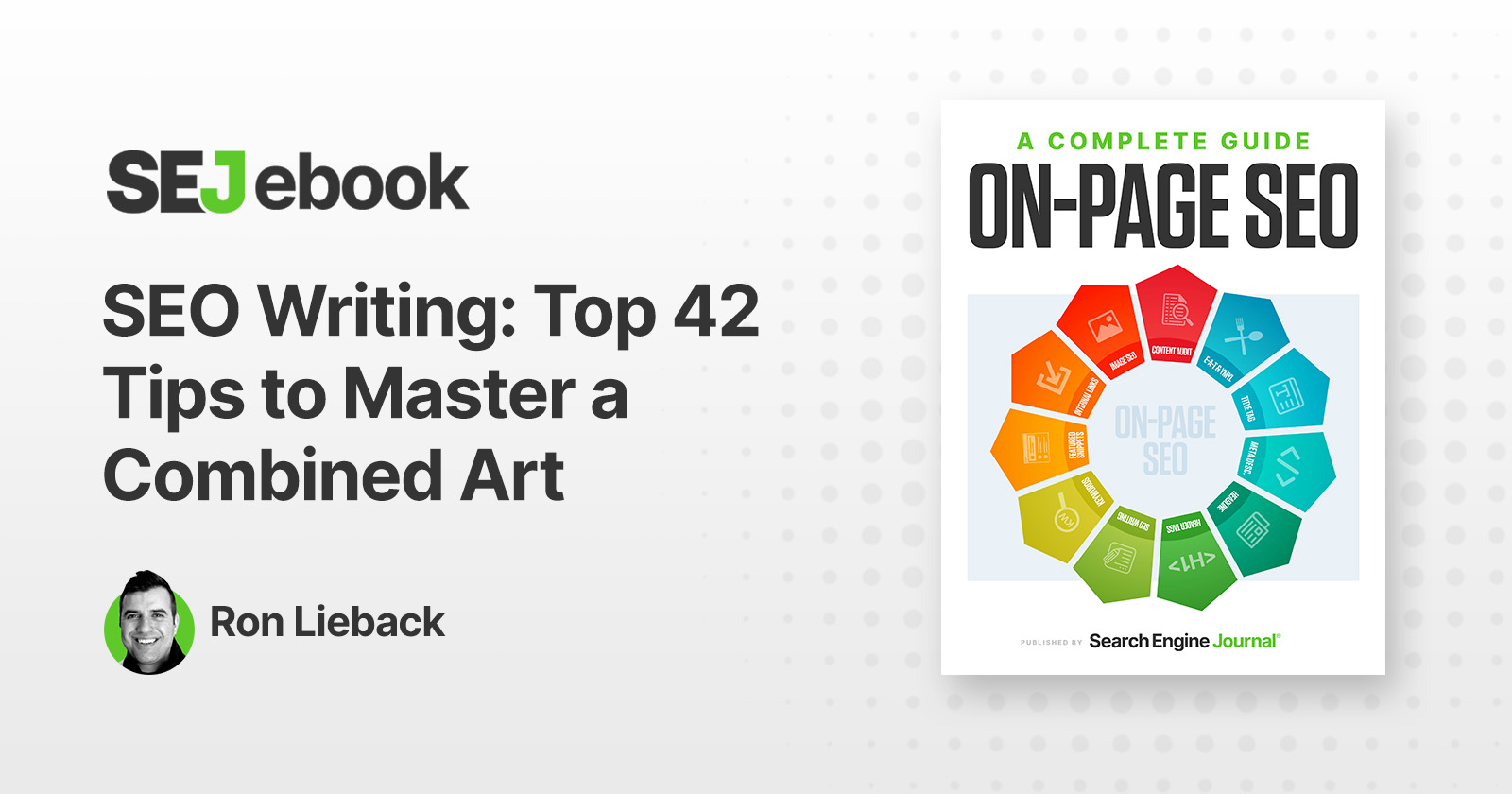SEO
Top 42 Tips To Master A Combined Art

True digital success – for search engine rankings, user experience, and the brand overall, whether personal or business – occurs when the art of SEO and the art of writing are combined.
The best SEO writing comes from the perfect blend of:
- Topical knowledge/expertise.
- Deep knowledge of writing well
- SEO best practices.
SEO is a must for any online writing, especially from a keyword perspective, and correctly mapping those keywords to pages/posts.
Readers can recognize an authoritative voice immediately, and a fake voice even quicker.
Whether you want conversions, brand awareness, or something else, your writing needs to have authority (and authenticity).
With that said, here are the top 42 writing tips for any content writer within any type of company, from billion-dollar software designers to local pest control companies.
The focus weighs more towards the art of writing itself, which will naturally lead to the creation of quality content that search engines demand.
Advertisement
Continue Reading Below
Writing for SEO: The Essentials
1. Think Keywords First
Your writing must be found before you’ll have any impact on your target audience. This is why keyword research should always come before any research or actual writing.
This keyword research will massively influence your research, also, because you’ll discover other ways your target audience is searching for your topic.
No matter how intelligent they become, search engine algorithms can’t recognize the best voice in a piece of writing. But if keywords are there, you have the opportunity to be heard.
New to keywords? Check out this beginner’s guide to keyword research.
2. Approach Keyword Research Like An Art
There are thousands of keyword research articles available. Research, discover, and test what works best for you.
Such as…
Make this process cyclical. I build content calendars out in three-month segments, performing fresh keyword research at the beginning of every cycle.
Industries change, and new keywords trend quicker than you’d guess.
Advertisement
Continue Reading Below
3. Study The Competition For Keywords
There are many tools available to help you find competitor keywords.
Warning: Only take keywords – don’t study the actual writing of your competitors. Once you do that, you sound like them and struggle to create anything original. Create an original voice and you’ll be heard.
4. Target 1 Or 2 Keywords For Each Page Or Blog (Except Homepage)
Always focus on broader terms for your main “parent” pages and longer terms for the “child” pages below.
Targeting searcher intent first, volume second will help you get into the mindset of what your target customer wants.
5. Use Keywords Where They Matter Most
Use your keyword in the following (prioritized of importance) to send search engines strong signals of the content’s intent:
- Title tag.
- Internal links within content.
- Alt attribute of image.
- Headline tags (always have an H1!).
- Meta description.
6. Use Bold & Bullet Points Wherever Possible
Google pays attention to these, including when awarding featured snippets.
Make sure to use target keywords in bold and bullet points when possible.
7. The Title Tag: Still The Most Powerful Element
Make sure your target keyword is part of the title tag, ideally toward the front.
Also, remember that title tags should be about 60 characters, so put as much time into this as your actual content creation.
For the homepage title tag, target three of the most important keywords that describe the business/website.
Always think about storytelling. Keep it simple. Speak the language of your target audience. And write to influence that click-through.
8. Add Related Keywords
Don’t simply stuff keywords in after doing the writing.
If you’re well prepared with keyword research, have the list of topically related keywords at hand as you write.
If you are staying on topic, you will insert related keywords naturally.
9. Use Your Target Keyword In Your Meta Description
Google says it doesn’t use the meta description as a ranking factor.
Advertisement
Continue Reading Below
However, if someone is searching for that target keyword or phrase, those words will be bold.
Bolding attracts the eyes – and might entice a searcher to click rather than scroll by.
Also, write your meta description like ad copy. The goal is to excite the audience to further influence a click-through (your title tag should be the first influencer, immediately backed by your meta description).
Writing For SEO: Craft & Routine
10. Write. Rewrite. Then Rewrite Again. Until It’s Right.
It’s all about routine and process.
As William Zinsser says in, “Writing to Learn:”
“Only by repeated applications of the process – writing and rewriting and pruning and shaping – can we hammer out clear and simple product.”
11. Outline And Plan
It’s much easier for a mind to think (and a search engine to read) in chunks, and actually see those chunks coherently.
Most minds naturally want to write in a stream of consciousness style like Jack Kerouac – but this isn’t novel writing. Most of us are writing for a business, to further that business’s success.
Advertisement
Continue Reading Below
Organize headlines (for SEO with keywords!) and fill in the gaps.
Sometimes those headlines are more important than the words beneath. Make those headlines scream thoughts, and the words shout to support those screams.
12. Write Sentence By Sentence
Set up Word or Google Docs in landscape mode for the first draft, and write sentence by sentence.
Don’t write any paragraphs until you do your first rounds of edits.
I learned this tip from Charles Euchner, author of “The Elements of Writing.”
Single-line sentences keep the mind fresh. They’ll help corral thoughts as you begin editing.
Think short for every sentence – like a 140-character tweet – and embrace short and concise writing.
13. Write Daily
A muscle grows when it has input combined with correlating relaxing points.
Your mind works that same way; embrace it.
Again, write daily to work out the writing muscles, followed by some relaxing.
Never stop the growth of writing muscles.
14. Shut Your Wi-fi Off
This tip comes from Tim Ferriss, author of “The 4-Hour Workweek.”
Advertisement
Continue Reading Below
This simple practice keeps focus in place and prevents the mind from answering anything outside of your focus.
Distractions move a mood. Make those distractions non-existent.
15. Got Questions? Ask Your Digital Assistant
The Wi-fi may be off, but sometimes you need immediate answers to questions that will nag you. Some can’t work without answering questions.
The solution is simple: ask Alexa, Siri, or your Google Assistant.
I keep an Amazon Echo Dot next to my desk and use it for quick research.
I have an Echo Show, but it doesn’t belong in the office where it can quickly jack your focus due to the video factor. That one remains downstairs, out of the office.
16. Read All You Can
Especially read the writers who simplify everything.
People may not love Hunter S. Thompson due to his politics or mad lifestyle, but his prose is crisp and simple. I read “Fear and Loathing in Las Vegas” in one sitting.
(And not once, but maybe 10 times when I needed a push into something I couldn’t possibly finish and needed a mind breath.)
Advertisement
Continue Reading Below
If you’re business-minded, Michael Gerber’s “The E-Myth” is a one-sitting read, too. It’s simple and informative.
17. Stop Waiting For Inspiration
It’s useless.
There’s no such thing as inspiration unless you like to talk about writing instead of actually doing it.
True writers write every day and make it a lifestyle that helps develop the “art.” Practice makes stuff happen and takes discipline.
Words simply flow better and easier after practice and discipline. Nothing happens without the simplicity of practice.
18. Read The Essentials
For traditional writing, read William Zinsser’s “On Writing Well.” Don’t just read it once. Reread it once a year.
For the digital age of “short” writing that makes an impact, read Roy Peter Clark’s “How to Write Short.”
Don’t stop there. Read “The Essential Don Murray: Lessons from America’s Greatest Writing Teacher” and “Ernest Hemingway On Writing.”
19. Try Writing In Longhand
This article is based on notes I took while flying over the Atlantic Ocean en route to Valencia, Spain.
Advertisement
Continue Reading Below
Flying is a great time for thinking and using longhand. Plus, it keeps your mind off the snoring passenger next to you.
Write in longhand in cabs, buses, middle of meetings, etc. Try it, and revisit those notes before you get to work typing.
20. Write About What You Love
To truly master the craft of the written word, embrace writing that makes you happy – regardless if it’ll make you money. The more you write, the better you’ll become.
Short writing provides inspiration (regardless of how absurd it feels or reads sometimes!).
21. Ask Questions Daily
Friends, family, wife, children, whoever. Continually ask questions.
The more you learn, the more you can provide readers (possible prospects in business), regardless of your industry.
Questions are the highlights of learning. Let people talk.
Think 80/20 – let others talk 80% of the time as you listen, and you can talk the other 20% of the time.
Your readers will thank you one day.
22. Know Your Audience & Write For Them
Remember to keep your voice and style the same.
Advertisement
Continue Reading Below
That’s how to set yourself apart from the zillions of other content writers out there.
23. Work Better Under Deadline?
For some people, the pressure of a deadline forces the creativity out of you.
If this is true for you, have project managers bump up your due dates.
I do this with my teams, sometimes by as far ahead as four weeks.
24. Build Your Work Around Questions
Always ask, “What’s the problem and how do I clearly provide a solution?”
It’s just as important to ask, “Will readers care?”
This helps keep your voice trustworthy and authoritative, keeping search engines and readers happy.
25. Split Long Projects Into Short Tasks
Write all headlines first (remember to use target keywords in them), and fill in each portion.
This works just as well whether you’re writing a 2,500-word piece on the craft of writing, or a 750-piece for a client discussing the technical aspects of a product.
26. Always Have An Ending in Mind
Knowing where your content is leading will keep your writing focus sharp, and will help you more often achieve the ultimate goal of most online writing – a conversion.
Advertisement
Continue Reading Below
27. Check Your Spelling & Grammar
Misspell a name and the article immediately loses credibility.
Craft your content with sloppy grammar, and the reader doubts your authority.
After you’ve checked for spelling and grammar errors, check again.
28. Aim For Credibility
Without credibility, you’ll lose any chance of capturing an audience’s attention.
Situations get worse if you spread false facts.
Take added time for research and fact-checking.
29. Edit With The 10-Second Rule In Mind
This goes for every single paragraph, especially for the first paragraph and meta description.
You want to immediately grab the reader’s attention — and keep it.
Is the article worthy of additional conversation? If so, and you have proper CTAs, this can help move readers one step closer to conversion.
Writing for SEO: Form
30. Write Strong Sentences & Paragraphs
The strongest words should begin and end a sentence.
The strongest sentences should appear at the end and beginning of a paragraph.
This helps keep the slower, more in-depth material in the middle, and the most important thoughts before the reader.
Advertisement
Continue Reading Below
31. Become Obsessed About Clarity Of Voice
Clean writing reflects a clear mindset – something people (clients!) need.
For example, Starbucks uses both functional and expressive language to clarify its voice in its marketing.
Or Mailchimp’s voice is plain spoken with a dab of dry humor.
 Screenshot taken by author
Screenshot taken by author32. Keep Writing Free Of Clutter
Keep it simple.
Get straight to what you’re saying.
Strip all useless words.
Get sentences into their simplest form.
Advertisement
Continue Reading Below
33. Beware Of Excess Adverbs & Adjectives
If the verb or noun can’t perform the explanation, that verb or noun isn’t strong enough. You can learn more about writing with adverbs and adjectives here.
34. Use A Variety Of Long And Short Sentences
A variety of sentence lengths helps your content to create some rhythm.
Readers enjoy this.
35. Short Paragraphs Allow The Mind to Breathe
Use short paragraphs often.
Space between paragraphs psychologically takes less energy to read, saving that prospect’s energy for the sale/lead.
36. Always Use Active Verbs
In this sentence, the active verb is “Use.”
Without active verbs, the mind shifts. It wanders.
You lose an audience… or a sale.
Be clear on what action the reader can take next.
37. Avoid Clichés
Like the plague.
You feel me?
Writing for SEO: Favorite Hacks
38. Listen to Your Favorite Music
Why not write to it? Some forms of music will bring drastically different emotions out on the page before you’d realize it, so the more the better.
Advertisement
Continue Reading Below
While writing this, I went from Coltrane to Infected Mushroom to Hendrix to SRV to Dimmu Borgir to Breaking Benjamin to Chopin.
For editing, Wes Montgomery was my go-to.
Music can help words flow, so embrace it all.
39. Commit To The Most Serious Writing In The Morning
I’m typically up by 5:30 a.m. That’s when my brain is freshest.
I always block a few hours every morning for my most serious writing.
40. Carry A Tablet To Jot Down Ideas
If you think clearer in longhand, carry a small tablet for jotting down ideas overusing your phone.
Moleskine tablets are my favorite because they are thin and fit into books, which I always have with me when traveling.
There’s only so much marginal space within a book for ideas; a tablet takes care of this and keeps you off the phone.
41. For Clients: Think 80/20 For The Initial Few Engagements
Focus on the 20% of your writing that will produce 80% results for the client’s sales. How?
Advertisement
Continue Reading Below
Simple: always begin a content strategy around the top ROI products. This shows value, and will help contribute to the overall qualified keywords you want them to want to rank for.
42. Remember To Get Away From It All
The writers that have the true minds to create and provide value to clients always need a break.
One of my weekly tactics for resting and reenergizing is “half-day Wednesday.” I tune out and either play guitar, hike or ride motorcycles… basically whatever is needed.
This mid-week break keeps the mind fresh and clear, which translates into positive workflow and, ultimately, happy clients.
Conclusion
Creating content that leads to conversion involves not only the art of SEO but also the craft of writing.
Embrace both if you’re serious about providing the most value to your readers or your client’s readers, which you naturally want to turn from prospects to customers.
Also, remember that the appeal and popularity of strong content will only compound online over time.
Advertisement
Continue Reading Below
Think of SEO writing to a business as compounding interest to an investor – have the patience and discipline to do it correctly, and the results should continually speak for themselves.
Featured image: Paulo Bobita/SearchEngineJournal













![How to Create A Website to Sell Products In 8 Steps [+6 Expert Tips] How to Create A Website to Sell Products In 8 Steps [+6 Expert Tips]](https://articles.entireweb.com/wp-content/uploads/2024/10/1727868370_How-to-Create-A-Website-to-Sell-Products-In-8.webp-400x240.webp)
![How to Create A Website to Sell Products In 8 Steps [+6 Expert Tips] How to Create A Website to Sell Products In 8 Steps [+6 Expert Tips]](https://articles.entireweb.com/wp-content/uploads/2024/10/1727868370_How-to-Create-A-Website-to-Sell-Products-In-8.webp-80x80.webp)




You must be logged in to post a comment Login